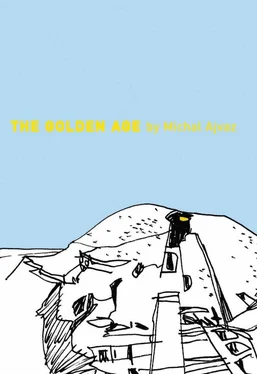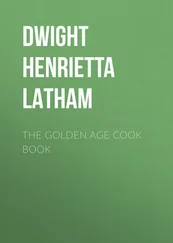Michal Ajvaz - The Golden Age
Здесь есть возможность читать онлайн «Michal Ajvaz - The Golden Age» весь текст электронной книги совершенно бесплатно (целиком полную версию без сокращений). В некоторых случаях можно слушать аудио, скачать через торрент в формате fb2 и присутствует краткое содержание. Год выпуска: 2010, Издательство: Dalkey Archive Press, Жанр: Современная проза, на английском языке. Описание произведения, (предисловие) а так же отзывы посетителей доступны на портале библиотеки ЛибКат.
- Название:The Golden Age
- Автор:
- Издательство:Dalkey Archive Press
- Жанр:
- Год:2010
- ISBN:нет данных
- Рейтинг книги:4 / 5. Голосов: 1
-
Избранное:Добавить в избранное
- Отзывы:
-
Ваша оценка:
- 80
- 1
- 2
- 3
- 4
- 5
The Golden Age: краткое содержание, описание и аннотация
Предлагаем к чтению аннотацию, описание, краткое содержание или предисловие (зависит от того, что написал сам автор книги «The Golden Age»). Если вы не нашли необходимую информацию о книге — напишите в комментариях, мы постараемся отыскать её.
is Michal Ajvaz’s greatest and most ambitious work.
The Golden Age
The Golden Age — читать онлайн бесплатно полную книгу (весь текст) целиком
Ниже представлен текст книги, разбитый по страницам. Система сохранения места последней прочитанной страницы, позволяет с удобством читать онлайн бесплатно книгу «The Golden Age», без необходимости каждый раз заново искать на чём Вы остановились. Поставьте закладку, и сможете в любой момент перейти на страницу, на которой закончили чтение.
Интервал:
Закладка:
Could an island on which everything takes place on the surface, where not even the mirrors and the transparent walls of water suggest any depths, where the most mysterious spaces — the shallow, gloomy caves with their gemstones — lie behind half-open doors, could such a place possibly have invisible depths? On the island I always knew that the discovery of a single hidden space would suggest the existence of a great many others. So had this fantastical possibility now become a reality? The existence of sachets of powder that transform into a mysterious flying ball was such an unexplained hollow. Might not the island be riddled with hollows, like a piece of cheese? Might it be concealing the underground temples of an unknown cult, where the islanders meet at night in secret? Or chambers carved in the rock containing the mummies of kings of old or ancient chronicles in which is recorded the island’s rich history?
I wondered now if the islanders had been playing a game of deception with me throughout my stay, if they had always laughed at me behind my back. And I felt a sharp pain at the thought that Karael, too, had been party to this game, that she had laughed along with the others at my ignorance and naivety, that she had left the bedroom at night to participate in the playing out of the island’s mysteries. Everything I had lived through on the island acquired a new meaning; in everything I found traces of deceit and ridicule. I wondered at my inability to recognize the obvious. And it came to me that everything I had written about the island up to that point was wrong. In my desperation I accessed my computer’s directory and the file that contained my narrative about the island and pressed the Delete key. But as I was reaching for Enter, I told myself I would sleep on it.
Achilles and Briseis
That evening there was a report on the television news about the gleaming ball. The reporter interviewed a number of inhabitants of Michle and Pankrác who gave excited accounts of what they had seen. (All of them drew two semi-circles in the air with their hands, beginning at nose level and ending with the joining of the fingers behind the knees.) There was also an interview with the president of some society which monitored UFO activity. In addition to this the broadcast included a curious video recording made by inhabitants of an apartment house that gave onto the brook; this showed the silver ball reflected in a mirror. I spent a restless night thinking about the island’s hidden face. I had a short dream in which I played silent witness to a night-time gathering of islanders revelling in an orgy of island voodoo, waking in terror once the islanders had discovered and surrounded me and were calling in jubilation, “Kill the intruder!” whilst waving their machetes.
In the morning I made my way to the apartment house in Michle, intending to investigate. A girl I had seen on TV the previous evening took me to the room where the recording had been made, but there was not much she could tell me about it. She had seen a shimmering silver ball which had stopped for several moments in front of the window to the room, almost as if it were looking in, and then flown off. The midday TV news would be on in a minute, she said. Why didn’t we watch it together to see if they’d found out anything else about the ball?
And indeed there was another item about the ball. A businessman had contacted the station, viewers were told, whose company imported pyrotechnics from China that contained a special powder. When this powder came into contact with water, a gas was released that formed in the air a ball whose gleaming surface gave the illusion of metal. Standing in the garden of his villa, the businessman took the opportunity to show off his merchandise to the cameras — we saw silver, green, violet and blue balls, cylinders and cones ascending slowly into the sky. Everything fell into place: the author of this part of the Book had got the pyrotechnical powder from a sailor on one of the boats moored in the island’s harbour, and by putting it in one of the Book ’s pockets he had been making a joke. Temples in the rock, witchcraft and secret island brotherhoods existed nowhere but in my imagination.
Now that everything has been cleared up, we could choose to return to Tana and Nau on Illim. But as we’ve already been diverted from the mythical archipelago to Michle, and as we’ve accepted that the longer the digression, the better, I shall tell you, dear reader, something about the video recording I saw on the television news. Indeed, it is more interesting than the whole matter of the supposed mystery of the island, which I now feel to be pretty worthless, even embarrassing. As I was saying, the video recording from Michle was rather strange. It showed the room the girl took me into the next day. The polished floorboards were bathed in a soft light; on the wall there was a large mirror in which the window and the overgrown hillside opposite were reflected; beneath the mirror there sat on a sofa of light-coloured leather a young man with neatly combed hair, wearing a brilliant-white shirt and an expensive-looking woollen suit. The young man was wordlessly fondling a girl wearing silk underwear; the girl’s hair was cut short and tinted blue, and she had a pale, motionless face and lips painted dark violet. Her eye shadow, too, was violet; the colour of her eyes was somewhere between turquoise and green. (When the next day I saw her face stripped of its make-up, with great shadows under her eyes, I did not immediately recognize her.)
Next to the sofa there was a stand with a chalkboard on it; on the chalkboard there was some kind of geometric drawing. On the wall there were several etchings of empty town squares, probably in Italy. In the part of the room closest to the camera there was a table with a glass top and legs of curved chrome. On the table there was a bottle of bourbon. Sitting at the table was a second man, also young and also wearing an elegant suit, this time with a tie. This second man was drinking contemplatively from a glass containing a gold liquid and ice cubes. Little electronic sounds drifted softly towards me, perhaps the outer froth of some kind of music. I had the impression I was watching an advertisement for cosmetics.
Then there was a tapping sound on the recording. The three figures looked at one another; the young woman moved in closer to her partner, but he extricated himself gently from her embrace and left the room. It was at this moment that the shining silver ball appeared in the mirror above the girl’s head and stopped. Of the people in the room, the only one who could see the ball was the ghostly cameraman, whose figure was present only in the motions of the pictures, which were now shaking slightly. Judging by the barely perceptible raising of her eyebrows, we can assume that the girl on the sofa had spotted the ball in the window. The young man with the bourbon was plainly startled; he must have caught sight of the ball’s reflection in the glass table-top. Still the three of them behaved like professionals and filming continued. In the meantime we heard the first man unlocking a door in the entrance hall, followed moments later by his voice, which sounded bitter and affronted, saying, “Welcome, heralds, messengers of gods and men; draw near; my quarrel is not with you but with Agamemnon, who has sent you for the girl Briseis.” So this was no advertisement for cosmetics: it was a modernist film adaptation of the The Iliad . (Why not indeed, if Ulysses can wander around Dublin?)
After a while the man playing Achilles returned to the room. When he caught sight of the silver ball in the mirror he gave a start; then he turned to the window and saw for sure the ball hanging in the air above the Pankrác plain. Finally his eyes settled on the third version of the ball, in the white, horizontal reflection of the table-top. All this took but a fraction of a second. This man, too, handled the unforeseen situation very well; he turned to the man seated at the table and addressed him by the name I had been expecting: “Patroclus, bring her and give her to them, so that they may take her away.” Then he called to Agamemnon’s messengers, who were still in the hall and out of the shot. “Let these two men be witnesses by the blessed gods, by mortal men, and by the fierceness of the king’s anger, that if ever again there be need of me to save the people from ruin…” While he was talking, the silver ball started to move again. Its reflection slipped silently behind the mirror so that all that was visible in it was again the dark Pankrác hillside. It may be that there was more video footage of Homer’s tale, but here the recording stopped so that the TV news could move on to the next item.
Читать дальшеИнтервал:
Закладка:
Похожие книги на «The Golden Age»
Представляем Вашему вниманию похожие книги на «The Golden Age» списком для выбора. Мы отобрали схожую по названию и смыслу литературу в надежде предоставить читателям больше вариантов отыскать новые, интересные, ещё непрочитанные произведения.
Обсуждение, отзывы о книге «The Golden Age» и просто собственные мнения читателей. Оставьте ваши комментарии, напишите, что Вы думаете о произведении, его смысле или главных героях. Укажите что конкретно понравилось, а что нет, и почему Вы так считаете.












